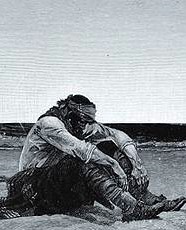
Scurvy Treatment Page Menu: 1 2 3 Next>>
Scurvy Treatment During the Golden Age of Piracy - Page 1
"...after being about four months in our passage from the Downs, after eating a hearty breakfast of salt beef, I found myself taken with a pain under my left breast, where I had formerly received a dangerous blow. From this time the sea scurvy increased upon me, as it had done upon many others, a good while before me; and I observed, they they soon took to their hammocks below, and became black in their armpits and hams [back of their thigh], their limbs being stiff and swelled, with read specks, and soon died; I therefore kept exercising in my duty, and went aloft as long as possible, and till forbidden by the officers, who found it troublesome to get me down with safety, as I frequently lost the use of my hands and feet, for a time, in the same manner as I had done when I received the above mentioned blow.
...

Howard Pyle
I thus struggled with the disease, 'till it increased so that my armpits and hams grew black, but did not swell, and I pined away to a weak, helpless condition; with my teeth all loose, and my upper and lower gums swelled and clotted together like a jelly, and they bled to that degree, that I was obliged to lie with my mouth hanging over the side of my hammock, to let the blood run out, and keep it from clotting so as to choak me..." (William Hutchinson, A Treatise on Practical Seamanship, p. 278)
There are many such harrowing accounts of scurvy on long sea voyages of scurvy. One surgeon from the sixteenth century explained that, "My thighs and lower legs were black and gangrenous, and I was forced to use my knife each day to cut into the flesh in order to release this black and foul blood. I also used my knife on my gums, which were livid and growing over my teeth…When I had cut away this dead flesh and caused much black blood to flow, I rinsed my mouth and teeth with my urine, rubbing them very hard..."
Scurvy was one of the greatest dangers to sailors during the Golden Age of Piracy. As Stephen R. Bown notes in his book Scurvy: How a Surgeon, a Mariner, and a Gentleman Solved the Greatest Medieval Mystery of the Age of Sail: "Historians have conservatively estimated that more than two million sailors perished from scurvy during the age of sail." (p. 3) He also says, "Shipowners and governments counted on a 50 percent death rate for sailors from scurvy on any major voyage." (p. 34)
A full understanding of the cure for scurvy would have to wait for the experiments of James Lind - more than twenty-five years after the Golden Age of Piracy (~1685 to 1725.) The recognition of what actually caused scurvy - a lack of Vitamin C or ascorbic acid - would not occur for almost two hundred years in the early 20th century. Being this is a GAoP pirate surgeon, I am going to spend most of this discussion presenting the disease as it would have been viewed at that time, when neither the cure nor the cause was fully recognized.
Woodall on Scurvy Diagnosis

John Woodall, the surgions mate author
John Woodall was the first English surgeon to write a manual for sea surgeons called the surgions mate in
1617. In it, he had a great deal about the disease and was even close to understanding the cure. Woodall
described scurvy in this way. (I am preserving his spelling and grammar, although I am adding some modern notes and formatting for
easier reading.)
"Of the Scurvie or Scorbutum
the signes.
The signes of the Scurvie are many, as namely, a generall lazinesse and evill disposition of all the faculties and parts of the body, saving the stomake and the appetite which oftentimes is greater then ordinarie with them along time.
A discouloring of the skinne as if it were fouler then ordinarie, with spots darker coulered then the rest, and sometimes also darkish blew spots.
A fever at sea commonly ends in the Scurvie, wherfore by the way beware of too large purging [either by using medicines to promote vomiting or diahrhea], or phlebotomie [intentionally letting blood to drain the 'bad humors'], which increase oft the griefe, and make it incurable: I speake this because I have noted there is a fault in young Surgeons of forwardnesse in taking too much bloud at Sea.
- Also itching or aking of the limes [limbs] are signes of the griefe.
- Sometimes the legges falling away, and drying the calves of the legges growing hard and drie, as also immoderate swellings of the legges: also the legges and thighes discoullered into frekells, or spots of a durty browne sad couller much like the couler of a gangrenated or mortified member
- Stinking of the breath.
- Great obstructions of the liver, or spleene, or both, and in the exercising of their bodies their limes [limbs], and their spirit failing them.
- Shortnesse and difficultie of breathing, especially when they move themselves, but lying still finde little griefe or paine.
- Their eies of a leady colour, or like darke violets.
- Great swellings in the face, legges, and over all the body; palenesse, or a foule pale coler in the face.
- Swellings of the gummes, rottennesse of the same, with the ishewing of much filthy bloud and other stinking corruption thence, loosenesse of the teeth: Also some are troubled with an extreame costivenesse that for 14 daies together they go not to stoole [excrete] once, wherefore the Surgeon is constrained with an instrument to take out excrements to avoide death, after which extreame costivenesse often followeth a great flux of bloud, and a painefull: also many have stoppings of the urine. Or at the least making lesse water [urinating] in two daies then the party drinketh in one day.
- A coldnesse and stifnesse of the sinowy parts, chiefly of the legges.
- Some also have their muskells [muscles], yea and sinowes of their thighes, armes, and legges so wasted away that there seemeth to be left only the skinne covering the bones.
- Also it is manifest that divers of those which have been opened after death, have had their livers utterly rotted.
Others have had their livers swolne to an exceeding greatnesse, some the spleene extreamly swolne, others have beene full of water, others their lungs putrified and thinke whilst they have lived, these and divers other signes too many all to be mentioned here, doe afflict poore seamen, which often are past mans helpe, in such place and time they happen, the cure whereof resteth only in the hands of the Almightie." (Woodall, p. 181-2)

